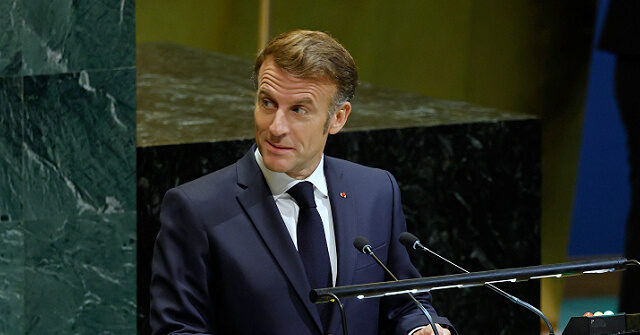French President Emmanuel Macron used his address Tuesday at the United Nations General Assembly to call for global support of international legal institutions, including the International Criminal Court, and to promote a new plan for peace in Gaza after recently recognizing the statehood of Palestine.
“Let us support the ICC in its fight against impunity. Let us allow the orders of the ICJ to be implemented, their rulings be upheld. The authority, the force of law, is our best chance in stopping the rule of might is right from prevailing,” Macron remarked. He argued that upholding international values was the only way to reject what he described as double standards in global governance.
Turning to the Middle East, Macron announced that 142 member states had signed the “New York Declaration,” a joint initiative by France and Saudi Arabia that he presented as a framework toward peace. He said the plan prioritized the release of all hostages held by Hamas, a ceasefire in Gaza, stabilization of the territory, and ultimately a two-state solution.
“Yesterday, we adopted a credible plan to put an end to the war in Gaza, to preserve a two-state solution, Israel and Palestine, to allow the release of all hostages and to save so many lives,” he stated. Macron outlined the vision of “a Palestinian state, which is demilitarized, which recognizes Israel, and an Israeli state, which recognizes the state of Palestine,” emphasizing reciprocal recognition as the foundation for regional stability.
The “New York Declaration,” which Macron dubbed as “credible,” envisions establishing a Palestinian state, but only if Hamas leaves power in Gaza, a condition the U.N. has no means to enforce. Israel, the United States, Hungary, and their allies dismissed the proposal as unrealistic, noting that Hamas has shown no willingness to hold elections, release hostages, or meet the conditions laid out in the resolution. President Donald Trump rejected the declaration as a “reward for Hamas” and barred Palestinian officials from traveling to the U.S. for related U.N. proceedings, citing longstanding agreements requiring peace to be achieved only through direct negotiations with Israel.
The French leader’s remarks followed his official proclamation on Monday that France would recognize Palestine as a state, breaking with decades of French policy and diverging from close allies the United States and Israel. The decision coincided with similar moves by the United Kingdom, Canada, Australia, and several European states. Hamas welcomed the recognitions, while Israeli President Isaac Herzog and U.S. President Donald Trump rejected them, warning that such steps reward terrorism and do not advance peace.
Domestically, Macron’s move drew praise from left-wing mayors across France who raised Palestinian flags above town halls, despite orders from Interior Minister Bruno Retailleau that only the French tricolor should be displayed on public buildings. Opposition leaders, including Marine Le Pen, condemned the recognition as a concession to Hamas.
Macron insisted his approach was aimed at offering Palestinians a political horizon while isolating Hamas. “Hamas is just obsessed with destroying Israel. But I recognize the legitimacy of so many Palestinian people. They want a state,” he noted in a U.S. television interview.
Macron’s appeal for support of the International Criminal Court also comes amid deep divisions over its role. The United States and Israel, neither of which are parties to the Rome Statute establishing the court, have long rejected its jurisdiction. President Trump has reinstated and expanded sanctions on ICC judges and prosecutors who pursued investigations targeting U.S. officials and Israeli leaders. Secretary of State Marco Rubio recently unveiled sanctions on Palestinian NGOs that attempted to use the ICC against Israel, reiterating that such actions undermine sovereignty.
Israeli Prime Minister Benjamin Netanyahu, who has been targeted by ICC arrest warrants, told Breitbart News that the court’s chief prosecutor, Karim Khan, issued those warrants after facing sexual misconduct allegations. Netanyahu accused Khan of deflecting from his personal scandals by acting against Israel, charges that have further eroded the ICC’s credibility in the eyes of critics. Khan has been suspended pending investigation.
Israeli officials have pointed to Hungary’s recent withdrawal from the ICC as an example of rejecting what they call the court’s bias, contrasting Budapest’s position with that of South Africa, which has championed ICC actions against Israel while maintaining close ties with Hamas and Iran.
Macron’s call to uphold the ICC contrasts with this wave of opposition. His position also follows a broader debate in France, where far-left politicians have been accused of cultivating ties with radical Islamist groups. After the assassination of American activist Charlie Kirk, some in the French press compared it to Germany’s 1933 Reichstag fire, while others likened his memorial service to Nazi rallies or even Taliban gatherings.
In his speech, Macron framed his initiatives as part of a wider mission for peace in the Middle East: “There cannot be any security or stability for Israel if we have a permanent war being waged with its neighbors. Peace with Palestine in the West Bank and in Gaza and throughout Jerusalem.”
Read the full article here


